Briefing MONTHLY #60 | March 2023
Unlocking Laos | AUKUS reaction | India relations | China’s new leaders | Japan investment | Thailand votes
Animation by Rocco Fazzari.
BELTING UP
China’s infrastructure building Belt and Road Initiative (BRI) slid further into Southeast Asia this month when a much promised online booking system for the Laos-China fast train finally went live.
More than a year after the launch of the train which is touted as the first leg of a new rail line all the way to Singapore, the new ticket system is set to fuel the tourist recovery in once isolated and landlocked Laos, which last year faced a Sri Lanka-style debt crisis.
The train was already carrying 10,000 passengers a day when BRIEFING Monthly finally secured a ticket earlier in the month amid increasingly chaotic queues when the booking office only opened for short periods in the morning and afternoon.
The online booking system was launched as Laos beefed up visa offices on its border with China and tourism industry representatives said they weren’t ready for a flood of returning Chinese tourists. The swings and roundabouts of giving into China’s push to build the US$6 billion (that’s about a third of Laos’ annual GDP) line from Vientiane to the Chinese border and then on to Kunming only seem set to intensify.
Our trip to Laos was inspired in part by wanting to see how Southeast Asia’s only landlocked country was managing to come out with worldclass transport infrastructure and part by its particular relevance to Australia’s new diplomatic push into the Southeast Asia. Laos will chair the Association of Southeast Asian Nations (ASEAN) when the Albanese government hosts a summit of regional leaders in Sydney next year and the country is also currently Australia’s coordination partner in the ten-member group.
See our exclusive interview with deputy Foreign Minister Thongphane Savanphet in ASIAN NATION below where he praises Australia’s role in opening the country to modern transport infrastructure with the Friendship Bridge to Thailand in 1994. How to build on this warmth towards Australia amid the growing Chinese presence in Laos will be a diplomatic challenge for Australia in the run-up to the summit.
Meanwhile, relations with India have received yet another huge round of anticipation this month with developments on university entry, new energy cooperation and military exercises. Amid the debate about democratic setbacks in Narendra Modi’s India with the court action again Rahul Gandhi, the new joint statement on bilateral relations stepped delicately around the issue of shared values with three references to this part of the relationship. But Prime Minister Anthony Albanese’s visit has consigned the old idea of a relationship built on the three Cs of cricket, the Commonwealth and curry to the dustbin of history. Instead, ASIAN NATION examines the evolution of a new matrix of four Es: equilibrium (in security); energy; education; and economics.
And while Australia’s new submarine deal extends far beyond Asian relations issues to matters including domestic skills and technology development, we wrap up the Asian reaction in DIPLOMATICALLY SPEAKING with some relevant commentary in ASIAN NATION.
Greg Earl
Briefing MONTHLY editor
NEIGHBOURHOOD WATCH
JAPAN/KOREA: hard labour
It might be a case of life imitating art, but when the leaders of Japan and South Korea met on March 16 for yet another attempt at ending old historical grievances, their citizens had already reconciled over pop culture.
About four million Koreans had flocked to cinemas to make an animation The First Slam Dunk the most watched Japanese movie in the country. Meanwhile in Japan, where Koreans have been responsible for about a third of the tourism recovery this year, the top pop song was OMG by K-pop girl group NewJeans.
The first bilateral visit to Japan by a Korean leader in 12 years by President Yoon Suk-yeol appears to have marked a major improvement in relations between the two western security alliance allies with Japan moving swiftly to end its export controls on computer chip components being sent to Korea. And Korea withdrew its World Trade Organization appeal over the controls.
The thaw in longstanding tensions between a conservative Korean leader and somewhat liberal Japanese leader Fumio Kishida was curious because neither has strong reserves of political capital domestically to pursue better relations.
Yoon initiated the thaw with his proposal to end a long running conflict over reparations for World War 2 forced labour and so-called comfort women by establishing a Korean private sector funded compensation fund and thus ending an earlier push to seek new wartime reparations from Japanese companies. However he is facing a considerable domestic backlash against this shift.
- Dan Sneider at East Asia Forum says Japan and Kishida now have the responsibility to respond in a way that keeps this long sought reconciliation alive.
CHINA: two Lis
China’s overall leadership has become older, narrower but also in some ways curiously more experienced as a result of the interaction between the reshuffle of government and Communist Party positions.
While incoming Premier Li Qiang has taken over leadership of the State Council unusually without previous experience as a vice-premier, President Xi Jinping has left several key government figures in place while also dropping them from Communist Party leadership positions.
Peoples Bank of China governor Yi Gang was reappointed to his position despite reaching the normal retirement age of 65 and finance minister Liu Kun, 66, has been reappointed. But Yi has been dropped from the Central Committee of the Communist Party, while Liu has been excluded from the Party’s Central Commission for Discipline Inspection.
Some observers have suggested that this apparent maintenance of some government continuity compared with the changes in the Party leadership last October reflects a desire to give the less experienced incoming premier some old hands to provide support. But the moves also reflect a downgrading of the State Council (or government) compared with the Party leadership where Xi has appointed loyalists.
Meanwhile on the age front, both Xi and former foreign minister Wang Yi, both 69, have broken the unofficial Party retirement age of 68 with Xi’s third term as President and Wang’s elevation to the Politburo.
Meanwhile outgoing Premier Li Keqiang at 67 could have remained on the Politburo Standing Committee but instead has been removed from both his Party and government positions as Xi has made it clear that the Party comes first in the new China.
The turnover in the premier’s job saw the outgoing Li deliver an cautiously independent sounding farewell message about how “heaven is looking at what humans are doing”. Meanwhile, the incoming Li has adopted surprisingly positive tone about the role of entrepreneurs and business in China despite Xi’s crackdown on technology and financial entrepreneurs.
- East Asia Institute director Bert Hofman argues in The Straits Times that China has now come a full circle from the 1980s moves to create some space between the party and the state.
THAILAND: party time
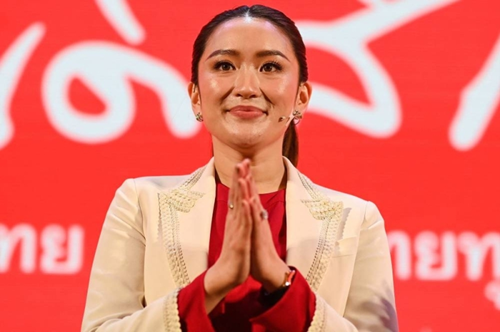
Frontrunner …. Paetongtarn Shinawatra Picture: AFP
Change seems to be afoot in Thailand when self-exiled former prime minister Thaksin Shinawatra is pondering returning to serve out a disputed jail sentence and the leaders of the 2014 military coup are now competing with each other to be a potential future elected prime minister.
Thais will vote for a new government on May 14 with polls suggesting Thaksin’s daughter Paetongtarn is the most favoured future leader and the family’s rebadged Pheu Thai Party is likely to win the most seats – but probably not a majority.
The bitter and sometimes deadly almost two-decade tensions between the establishment “yellow shirts” and pro-Thaksin and youthful “red shirt” protesters seems to have been replaced by a frenzy of party jumping and spending promises as old and new political forces manoeuvre for advantage after the election.
Pheu Thai, the youth oriented and reformist Move Forward Party and the cannabis liberalising Bhumjatthai Party, which is part of the current government, all seem set to prosper from the more open election environment provoking a scramble by the older and more pro-government parties to form new coalitions.
- At The Bangkok Post, Thitnam Pongsudhirak says the competitive election will put the country’s somewhat discredited election agencies and courts under a new spotlight.
ASIAN NATION
UNLOCKING LAOS
As the deputy foreign minister and top ASEAN official in Laos, Thongphane Savanphet seems set to be a little appreciated figure in the Albanese government’s efforts to fashion a new Southeast Asia engagement strategy with a new business policy and a summit of Southeast Asian leaders in Sydney next year.
This will be the second such gathering after the inaugural 2018 summit in Australia but may well take on more significance after the release of the government’s new strategy for increased business engagement with the ASEAN countries and the manoeuvring over China’s rise, underlined by this month’s nuclear-powered submarine announcement.
Maintaining a positive relationship with Laos, one of the last remaining communist countries in the world, will be important because it will be both the ASEAN chair country during the summit and Australia’s coordination partner in ASEAN until the middle of next year.
In an interview with Briefing MONTHLY, Russian and British educated Thongphane says he is looking forward to a sideline business event and some agreements on maritime cooperation from the summit. He also sees potential for more bilateral cooperation in agriculture, vocational training, acceptance of Lao workers (as was planned under the old agriculture visa), and he would like to see more Australian students coming to his country under the New Colombo Plan.
He pointed to an Australian-funded scheme for Laos to use its experience as a relatively new and small entrant to ASEAN to help Timor-Leste make the same transition as an example of creative cooperation with Australia. “We can help them with training their officials in trade, with the need for English and how to get their businesses more active in ASEAN. We can keep up with all of that now,” he reflected on his own country’s steep learning curve after joining ASEAN in 1997.
He also welcomed closer defence ties between the two countries with the appointment of a defence attaché at the Australian embassy but suggested progress had been slower on more Australian Federal Police engagement even though he described drug trafficking and use as the country’s number two national priority after economic recovery.
And as the new train has transformed his country’s tourist transport, the deputy minister said Australia had played a key role in initiating transport infrastructure modernisation with the construction of the Friendship Bridge to Thailand in 1994. Apart from the new train, that infrastructure could include more Mekong bridges, a planned train/road corridor to a Vietnamese port and even a possible tourist rail connection into Cambodia.
As for Laos’ third time in the ASEAN chair next year, Thongphane said he expected the regional financial situation will have improved with the return of tourists. And despite particular expertise in dealing with Myanmar due to a shared border, he said Laos would be sticking with the ASEAN consensus position on the country’s internal divisions. “Myanmar will take time to resolve. It’s not easy for ASEAN,” he said.
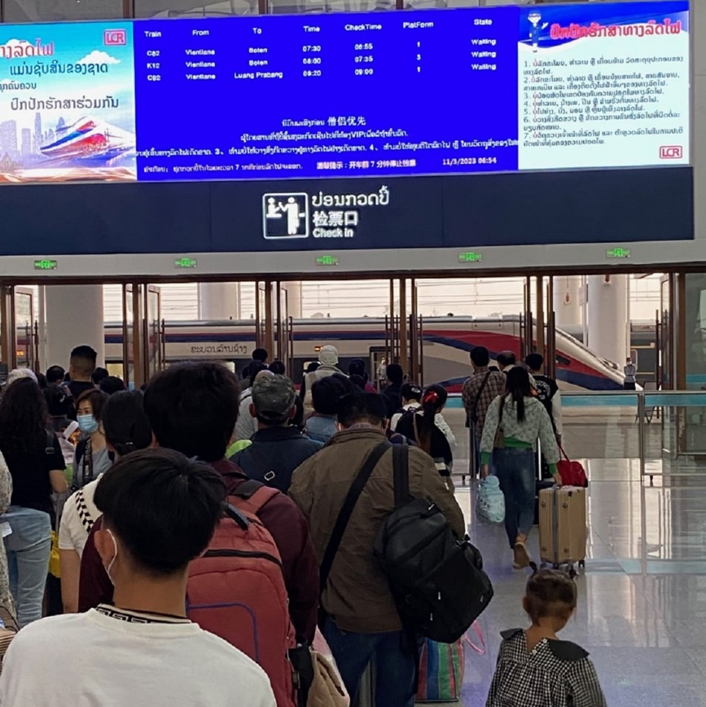
Vientiane’s new Chinese-built train station Picture: Greg Earl
LAOS: paying the piper
The apparent high use of the new train even before tourist visits to Laos reach a third of pre-pandemic levels adds another layer to the debate about whether the country has taken on too much debt from China to jump ahead of its neighbours in rail transport.
The construction cost was US$5.9 billion for the 400 kilometres to the Chinese border with extensive tunnels, which is about one third of the country’s annual GDP. However, China paid about 70 per cent of the bill apparently in return for the potential broader access beyond Laos and land access along the route. It also provided additional service and equipment assistance. The Laos capital share is reportedly funded by Chinese lenders.
Thongphane was quick to point out in our discussion that Laos has avoided predictions of a foreign debt-driven financial collapse like Sri Lanka suffered last year. However, it is unclear for how long or on what terms China has provided debt rescheduling to cushion the reality that public debt was set to equal annual GDP by the end of last year, according to the World Bank. Its annual debt servicing obligation of about US$1.3 billion was forecast to equal its foreign reserves until the opaque apparent rescheduling with China.
Laos gets some attention in a new study by aid economists which has revealed that China is now a major player in global debt rescheduling with US$240 billion in developing country bail out operations in 2020 and 2021.
The report says Laos has a debt exposure to China of at least 43 per cent of GDP and made its first use of Chinese emergency lending in June 2020 to increase its foreign reserve position. It also sold a large part of its electricity transmission grid to a Chinese state-owned enterprise in September 2020 for US$600. The report doesn’t cover last year as interest rates rose and the train started operating.
A Japan External Trade Organisation researcher economist Keola Souknilanh has estimated that under a very optimistic scenario where the areas around train stations are developed to raise the productivity of the services sector by five per cent, Laos could recover its investment in as little as three years. But just running the passenger and goods trains a bit more frequently than is currently the case could mean it might take two decades to recover the investment.
- See: Unlocked Laos looks for new links at The Interpreter for more about Australia’s relationship with Laos.
INDIA: four Es
For half a century, Australian prime ministers have had a habit of rediscovering India with a lavish dose of shared interests in the three Cs of cricket, the Commonwealth and curry.
Prime Minister Anthony Albanese seemingly couldn’t resist overdosing on cricket on his recent visit, but he can probably claim to have reset the agenda - at the risk of strained alliteration - to four Es of equilibrium (in security), energy, education and economics.
The official statement from the first annual prime ministerial summit suggests a new hierarchy of economy and trade reflecting revamped business ties and a commitment to a full trade deal; followed by climate change cooperation reflected in things like solar panel production cooperation; then defence and security cooperation underpinned by two joint military exercises; and only then people-to-people ties including Australian universities setting up in India.
But it is hard to underestimate the role of the deepening security engagement driven by the rise of China and the emergence of Indians as Australia’s fastest growing diaspora in underpinning the breadth and depth of the new relationship.
In some of the key developments from one of the largest Australian ministerial and business delegations to visit one country in a concentrated period:
* Albanese said he would like to see a Comprehensive Economic Co-operation Agreement (CECA) agreed in principle at least by the end of the year putting him on a similar ambitious trajectory to his predecessor Tony Abbott’s plan to do the CECA in a year in 2014.
* The countries exchanged terms of reference for the Australia India Solar Taskforce which will provide advice on opportunities to accelerate solar PV deployment and enhanced supply chains. There is also a plan for a hydrogen task force.
* A memorandum of understanding was signed between the Business Council of Australia and the Confederation of Indian Industry paralleling such as agreement in Indonesia last year.
* Australia announced former KPMG partner Tim Thomas, who has a financial services background will be the chief executive of the new Centre for Australia-India Relations.
* The countries signed an Audiovisual Co‑production Agreement intended to generate co-productions in both countries with access to soft government funding.
* After regional economic relations were setback by India’s withdrawal from the Regional Comprehensive Economic Partnership, they are now being rebuilt around the Indo-Pacific Economic Framework and the supply chain resilience initiative with Japan. Critical minerals are a big feature with work between India’s Khanij Bidesh and Australia’s Critical Minerals Office.
* In addition to new joint military exercises, increased military interoperability and information sharing, the leaders backed aircraft deployments from each other’s territories.
* Officials were told to conclude a Migration and Mobility Partnership Arrangement in three months to support the mobility of students, graduates, academic researchers, businesspeople and other professionals.
* Deakin University will become the first university to open a campus in India in the Gudjarat International Finance Tec-City with a relatively small initial program of 100 students a year doing masters courses in business analytics and cyber security.
EDUCATING ASEAN
The head of a network of Southeast Asian universities has urged the Australian government to provide backing to an initiative in which Australian education institutions would cooperate to improve English language skills amongst Southeast Asian academics.
ASEAN University Network (AUN) executive director Dr Choltis Dhirathai said his members would be very comfortable working with Australian universities on improved English skills, but the idea was not receiving government support unlike other AUN initiatives with Japan, the European Union and India.
“We could have gone to Britain or the US for our (English) language capacity building in ASEAN but the feeling is our universities are quite comfortable working with Australian universities,” he told a panel at the Asia-Pacific Association for International Education conference in Bangkok.
He said 25-35 per cent of Southeast Asian universities had good English capabilities, about half needed to do significant work on improving capabilities and about 25 per cent were severely underdeveloped.
Choltis says Australian institutions could provide a quality assurance system for his universities in various areas of English capability. This would start with improving the quality of English language papers to improve the international research reach of ASEAN institutions. It would then move to improving the fluency of English language teaching across faculties and then extend to the provision of courses in English to attract more international students to the region.
ASEAN education consultant Michael Fay told the conference that English was the language that increasingly united the multi-lingual ASEAN region and this would only grow, so Australian institutions had an opportunity to play a key role in shaping this development.
PACIFIC COMMON MARKET
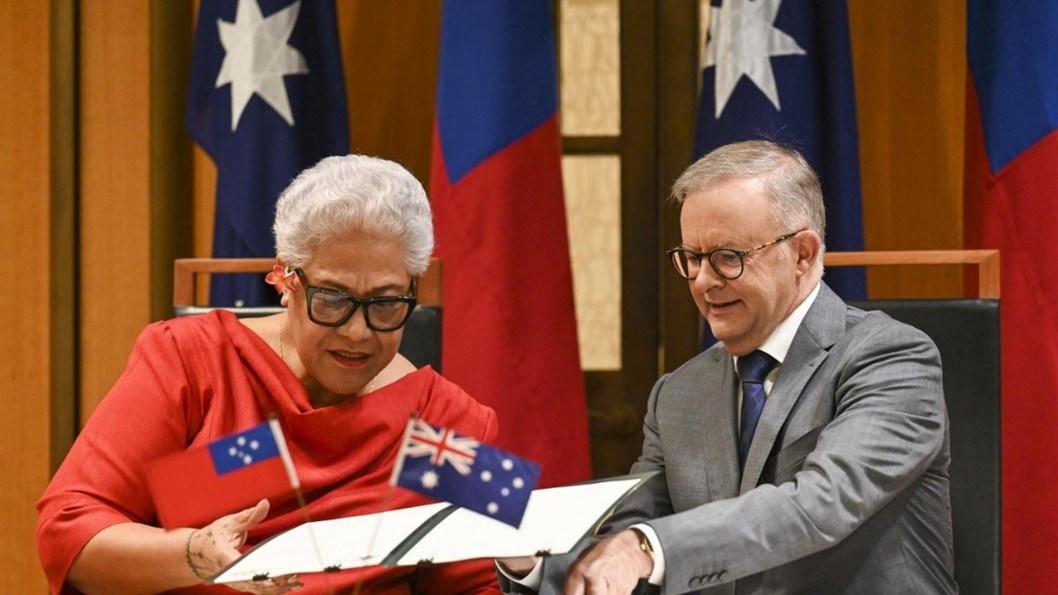
Fiame Naomi Mata’afa and Anthony Albanese sign a new Bilateral Partnership Arrangement
Samoan Prime Minister Fiamē Naomi Mataʻafa has called for the creation of a European Union-style common market in which people could move and work freely across the Pacific region region.
Calling on Australia and New Zealand to give more substance to their frequent reference to a “Pacific family, one of the region’s newest leaders said the ideas was contentious but was necessary to deal with the growing big power politics in the region and the challenges of climate change.
Speaking at a lecture in Canberra where she also signed a new Bilateral Partnership Arrangement with Australia, she said a recent visit to Europe had inspired the idea and she had already raised it with Minister for Foreign Affairs Penny Wong.
She told reporters she would have concerns if the Australian government doesn’t ban future coal and gas projects, with climate change one of Samoa’s “biggest threats.”
Samoa is due to host the Commonwealth Heads of Government Meeting next year which is likely to involve Australia playing a major financial and security support role much as it did when Papua New Guinea hosted the 2018 Asia Pacific Economic Cooperation group summit.
UNDERWATER MATTERS
The announcement of the submarine deal between the three AUKUS partners in San Diego on March 14 has tended to generate more heat than light ranging from former prime minister Paul Keating here and here to the Red Alert series in the Nine/Fairfax newspapers which is analysed here. And the issues both extend beyond our remit and have been well covered elsewhere.
But two of the most consequential reflections on what the agreement might mean for Australia’s engagement with Asia have come from University of Queensland chancellor and former DFAT secretary Peter Varghese and former Labor foreign minister Gareth Evans.
At The Australian Financial Review, Varghese writes: “There are strategic costs to weakening the discipline behind the Defence of Australia doctrine if that is where we are heading. It takes us further away from the longstanding objective of being able to defend Australia harnessing the US alliance but without relying on the combat assistance of the United States.”
At The Guardian, Evans argues: “When it comes to decisions to go to war, we have too often in the past, most notably in Vietnam and the Iraq war of 2003, joined the US in fighting wars that were justified neither by international law nor morality, but because the Americans wanted us to, or we thought they wanted us to, or because we wanted them to want us to.”
And amid renewed debate about the best way to defend Australia on the 20th anniversary of the Iraq war, New York Times columnist Ross Douthat reflects on whether the Vietnam or Iraq wars did the most damage to the US. “In American domestic life the Vietnam effect was more of a fever, whereas the Iraq effect seems like a wasting or relapsing disease,” he says.
DEALS AND DOLLARS
JAPANESE LESSONS
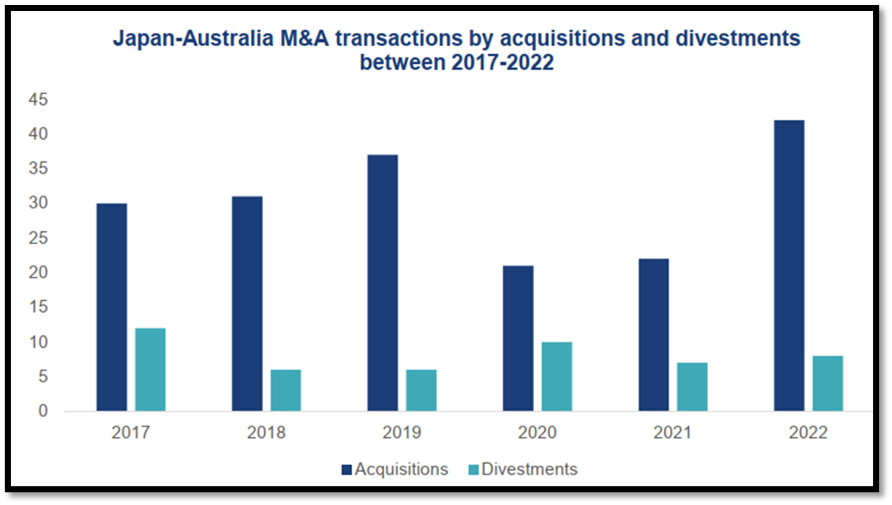
Source: Herbert Smith Freehills
Japanese investment in Australia picked up sharply in 2022 with 42 new acquisitions – almost double the level seen in the previous two pandemic affected years.
And with the country now established as the second largest cumulative foreign direct investment source it has stepped up muscle-flexing over Australian industry policies last seen in the winding down of the car manufacturing industry. Inpex chief executive Takayuki Ueda told a Canberra function on March 30 that Australia was falling behind in the race to be a “clean energy superpower” due to a deteriorating investment climate, joining the serial criticism by outgoing Ambassador Shingo Yamagami of various gas industry regulation. Ueda’s criticism has particular weight with the $60 billion Inpex Ichthys gas project off Darwin now the largest single investment as part of the new wave of investment seen in the past decade.
The annual survey of investment by Herbert Smith Freehills released the day before Ueda’s speech declares: “There has been a step change in the relationship as a result of the changes in the global geopolitical environment. It is now a closely aligned partnership with greater government and business collaboration, and more cooperation than ever before.”
And it points out that of the 42 new investments last year, 15 were energy related as the two countries step up both investment and cooperation in trying to transition from a fossil fuel-based relationship to new energy. It highlights how there were 51 new partnerships mostly in new energy which involve a shift from purely commercial transactions to cooperation involving government agencies and research institutions.
The report says this “new paradigm” – after the traditional minority investment in resources projects and then full takeovers in recent years in diverse industries – will be a long term new feature of the business relationship. It “will form the basis of significant new investment over the next 5-10 years, as projects are commercialised. New energy partnerships are continuing to form, driven by Japan’s need to ensure a secure source of imported energy in a decarbonising world.”
The report notes the headwinds to Japanese investment from new federal and state government gas regulation, but slightly discordantly with Ueda’s speech says Japanese investors are “comfortable with Australia as a stable and reliable destination for their capital.”
And, on the day of Ueda’s blunt speech, it was interesting to see Japan External Trade Organisation president Kazushige Nobutani say, while launching the investment report, that Japanese investors also faced similar energy regulation changes to Australia in other countries. He expressed confidence Japanese companies could calmly deal with the changes.
However, in an unusual display of bipartisan North Asian self-interest, the Chinese embassy in Canberra has joined the Japanese criticism of Australia’s energy policies telling The Australian Financial Review: “It’s a major issue involving concerns of both of us. Definitely we will look at this case with serious attitude.”
CHINESE INVESTMENT
China appears to be stepping up its focus on Australian foreign investment regulation as negotiations intensify on how to wind back its trade restraints on a range of mostly Australian commodity exports.
Speaking after a meeting with Deputy Minister of Trade, Tim Ayers, at the Boao Forum late last week, International Trade Representative and Vice-minister of Commerce Wang Shouwen said China was highly concerned about Australia's tightened security review of investment by Chinese companies and the power of national security should not be abused.
He also expressed concern about Australia's anti-dumping and anti-subsidy measures against Chinese goods, saying China was willing to work with Australia to find constructive solutions to these issues.
Ayers said after the meeting that he had again emphasised to China that if Australia’s World Trade Organization complaints about China’s restraints on wine and barley could be resolved by discussion and agreement then that would be in interests of both Australia and China.
While trade minister Don Farrell’s much forecast visit to China appears to be on hold as these matters are discussed at the officials level, there seems to be some potential trade off going on involving China changing its trade restraints and Australia reviewing its foreign investment and anti-dumping processes. Indeed, Chinese ambassador Xiao Qian has continued his charm campaign by suggesting that his country is interested in investing in Brisbane 2032 Olympics infrastructure.
Ayers said Australian coal was now going into China and restrictions on timber had been eased. But it was less clear when restrictions on other products such as lobster, wine and barley would be removed.
TEA BREAK
One of the world’s biggest tea companies, Dilmah Tea, says it will remove its products from Australian supermarket shelves unless the major retail chains agree to premium prices for its handcrafted brands of Ceylon teas.
Dilmah, Sri Lanka’s biggest global brand, is sold in more than 100 countries and is among the top 10 tea brands globally. But it says it has been losing money in Australia because it refused to compromise its commitment to sustainability and ethical sourcing.
Dilmah Tea chief executive Dilhan Fernando told The Australian he was prepared to pull out of mainstream retail and become a premium brand for sales just through hospitality venues and online unless retailers stopped pushing the firm to commoditise its brand and compromise its sustainable supply chain through discounting.
The tea industry employs around 10 per cent of the workforce in Sri Lankan which is suffering a political and debt crisis and Fernando claims Dilmah’s artisanal approach to tea production which is 95 per cent exported is an important contributor to the country’s economy. Commoditisation of the product would undermine a traditional approach to tea production.
Disclosure: Briefing MONTHLY production is often fuelled by Dilmah Tea.
DIPLOMATICALLY SPEAKING
Official comment on AUKUS from around Asia
"Indonesia has been closely watching the AUKUS security partnership cooperation, particularly the announcement regarding the path AUKUS will take to reach a critical AUKUS capability level. Maintaining peace and stability in the region is the responsibility of all countries … Indonesia expects Australia to remain consistent in fulfilling its obligations under the NPT [Treaty on the Non-Proliferation of Nuclear Weapons] and IAEA safeguards, as well as to develop with the IAEA [International Atomic Energy Agency] a verification mechanism that is effective, transparent and non-discriminatory."
- Indonesian Foreign Ministry statement
"Malaysia acknowledges the needs of countries in terms of enhancing defence capabilities … Nevertheless, Malaysia’s position on AUKUS remains. Malaysia reiterates as a matter of principle the importance of all parties within and beyond this security partnership to fully respect and comply with the existing Malaysia’s national regime in relation to operation of nuclear-powered submarines in our waters, including those under the 1982 United Nations Convention on the Law of the Sea (UNCLOS), the Southeast Asia Nuclear Weapons Free Zone (SEANWFZ) Treaty, and the ASEAN Declaration on the Zone of Peace, Freedom and Neutrality (ZOPFAN)."
- Malaysian Ministry of Foreign Affairs statement
"For the Philippines, it is important that partnerships or arrangements in the Indo-Pacific region, such as AUKUS, support our pursuit of deeper regional cooperation and sustained economic vitality and resilience, which are essential to our national development and to the security of the region. We consider it important for these arrangements to uphold ASEAN's central role in the regional security architecture, and reinforce an international rules-based order that underpins regional security and development."
- Philippines Department of Foreign Affairs statement
"It reinforced the feeling we’ve always had when we look back over the conflict the world has entered into in the past."
- Fiji Prime Minister Sitiveni Rambuka after meeting Anthony Albanese (15/3/23)
"China urges the US, the UK and Australia to earnestly fulfill their non-proliferation obligations and refrain from undermining the authority and efficacy of the International Atomic Energy Agency’s safeguards system. We also urge the IAEA Secretariat to perform its duties in strict accordance with its mandate and not to endorse the act of nuclear proliferation by the three countries. In the meantime, China calls on all IAEA member states to actively promote the intergovernmental process, find a solution to the safeguards issues in relation to the AUKUS nuclear submarine cooperation, safeguard the international nuclear non-proliferation regime with the NPT as the cornerstone, and maintain international peace and security."
- Chinese foreign ministry spokesman Wang Wenbin
"We are thinking along with other ASEAN countries. We also express concern. They say there is no nuclear [weapon] but if it is a nuclear weapon … would they allow us to check the submarine? [Of course] they would not allow it. The big country should not bully the small country."
- Cambodian Prime Minister Hun Sen (16/3/23)
The Federated States of Micronesia “trusts that AUKUS is in the region’s security interests and trusts that Australia will continue to adhere to regional and international best practices on nuclear non-proliferation.”
- Spokesman for Micronesia President David Panuelo
"The 2011 Fukushima disaster highlighted the danger of nuclear power to human health and the environment. As we discuss nuclear-powered submarines in the Pacific, we must also address concerns about increased militarisation of the region."
- Tuvalu Foreign Minister Simon Kofe on Twitter.
Papua New Guinea ratification of the 1996 Comprehensive Nuclear Test Ban Treaty is “now in National Executive Council for final approval to go to the floor of parliament to be ratified so that Papua New Guinea is totally against any nuclear weapon in PNG or in the Pacific region.”
- PNG Foreign Minister Justin Tkatchenko when asked about AUKUS
“We are faced with the perplexities of varying versions of the Indo-Pacific strategies. The underlying lack of understanding of the Pacific countries of how and when the two large ocean spaces morphed into the Indo-Pacific and the rationale behind the concept” she said was in part the fault of development partners such as Australia, Japan, the United States and New Zealand.
- Samoa Prime Minister Fiamē Naomi Mataʻafa when asked about AUKUS
"The issue here is that we should have paid much more attention to the Indo-Pacific strategy as it emerged. And we were not ever consulted by the countries that are party to that, including some of our own members of the Pacific Island Forum. Then the emergence of AUKUS. Pacific countries were never consulted on this either."
- Former Pacific Islands Forum secretary general Meg Taylor
DATAWATCH
CHANGING CHINA
China is emerging as a car export powerhouse...
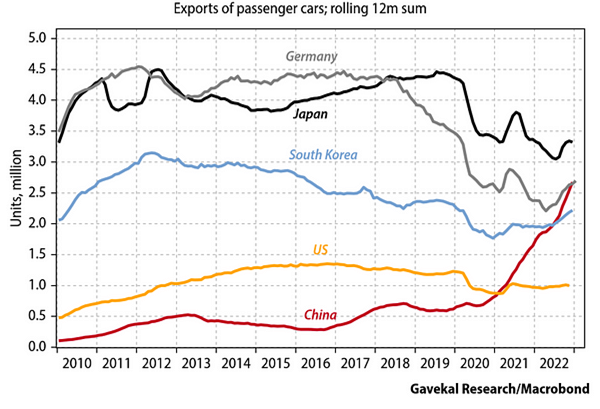
But Singapore's air traffic is overtaking Hong Kong.

Source: Financial Times
ON THE HORIZON
LOOK EAST
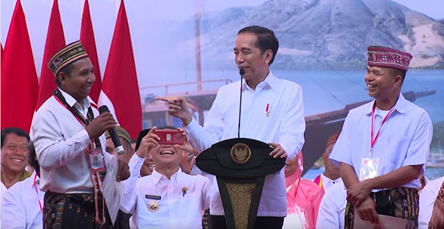
New Bali: Widodo inspecting ASEAN preparations in Labuan Bajo.
Indonesian President Joko Widodo is taking his Southeast Asian colleagues on a tourism marketing mission to the heart of underdeveloped eastern Indonesia for his country’s year running the Association of Southeast Asian Nations (ASEAN).
Consistent with his policy of developing ten (or sometimes five) “new Balis”, the first of this year’s two annual ASEAN Summits will be held in Labuan Bajo in East Nusa Tenggara province (or Flores Island) in May with a plan to attract 250,000 new tourists as a result.
The first summit will be held on May 9-11 kicking off an intense month of regional summits with the Group of Seven meeting in Japan and the Quadrilateral Security Dialogue in Sydney.
In one of the first policy shifts under Indonesia’s ASEAN leadership, finance ministers from the group last week agreed to reinforce the use of local currencies in the region and reduce reliance on major international currencies in an effort to avoid spillovers from global crises.
Indonesia is under pressure to use its ASEAN convening power to make progress on resolving tensions in Myanmar. But despite announcing he would appoint a senior Indonesian military officer to push forward talk with the Myanmar military – which once saw Indonesia’s military as a role model – there has been no progress so far.
